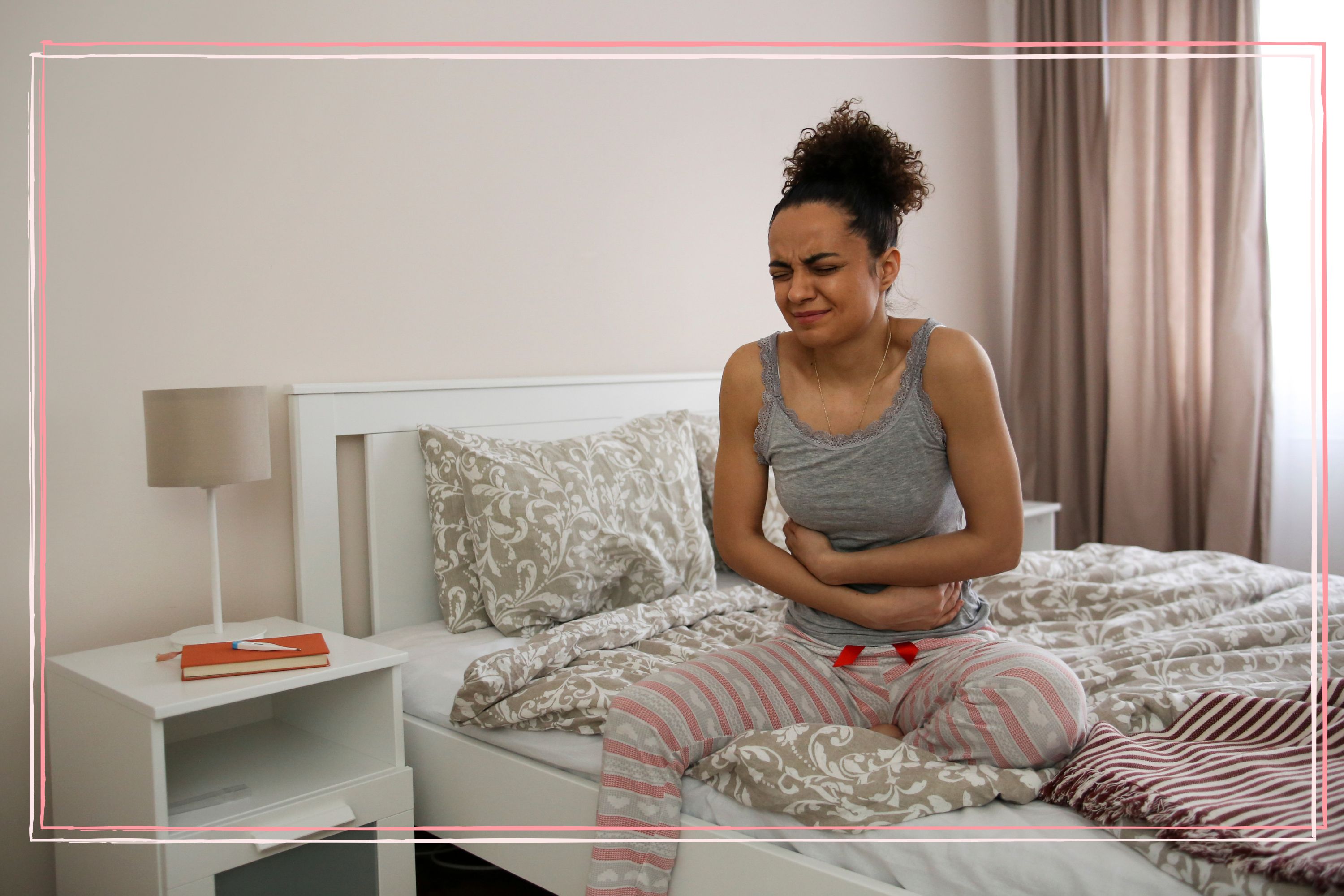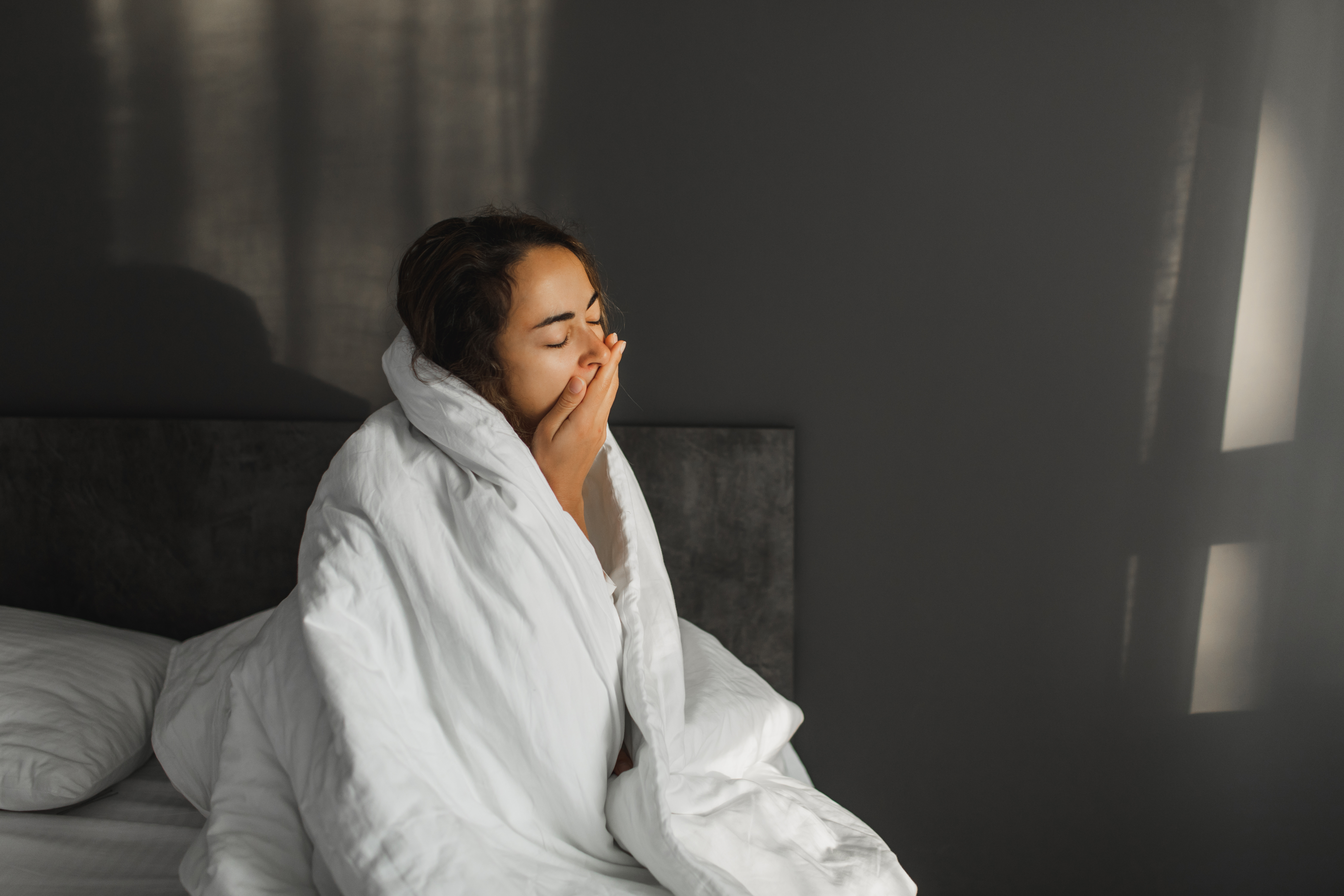Why do I feel sick in the morning? Most common reasons for morning nausea
Fatigue, anxiety and low blood pressure are just some of the reasons why you might feel sick in the morning - we asked the experts to explain them

Dr Deborah Lee

Pregnancy is one common cause, but there are many other reasons why you might feel sick in the morning.
By now, you've probably already considered (and Googled) all the reasons why you might be feeling unwell when you wake up - and often the answer that will come back will tell you that it's the start of morning sickness, one of the early signs of pregnancy. But what if you're not pregnant? Much like feeling sick after sex, there are varied causes of morning nausea, from anxiety and dehydration to low blood sugar or hormones.
Dr Deborah Lee from Dr Fox Online Pharmacy says, "Most of us have felt nauseated from time to time, and feeling sick, specifically in the morning, is not uncommon. In general, the best way to get rid of morning nausea is to identify and treat the underlying cause."
If you're struggling with feeling queasy when you wake up but don't know why, take a look below. We've asked the experts why you might feel sick in the morning and what you can do to stop it.
Why do I feel sick in the morning?
1. Fatigue
A lack of sleep wreaks havoc with our circadian rhythm, leading to exhaustion that can make you feel sick in the morning. Not having enough sleep can also make us feel grumpy, irritable and unable to focus on everyday tasks.
This is because being sleep-deprived can lead to hormonal imbalance as well as inflammation of the intestines. In fact, one study in the Journal of Gastroenterology and Hepatology found a strong association between sleep disturbances and gastrointestinal diseases, as well as pro-inflammatory proteins linked to the immune system - which could be the source of nausea.

How to fix it: The first step to sleeping better is to fix your sleep schedule. Rob Hobson, author of The Art of Sleeping, advises, "Commit to a set wake-up time then work backwards to establish the time at which you need to go to sleep. If your goal is 7.5 hours’ sleep in total, and you aim to wake up at 6.30am, you should be looking to fall asleep at 11pm. A sleep starting point between 9.30pm and 11pm works in sync with the natural flow of your circadian rhythm."
Another top tip is to resist hitting the snooze button when your alarm goes off - even though it's tempting. "Falling asleep again will leave you feeling groggy and nauseous because you put your body and brain out of sync with their natural rhythm," Rob adds.
2. Anxiety
Feeling sick in the morning can also boil down to a symptom of anxiety. Dr Deborah Lee explains, "When you wake in the morning, your brain is immediately bombarded with all the issues of the day. This jolts you into reality and may mean anxiety symptoms are at their worst, first thing."
This anxiety can often be made worse by other factors, such as hormonal changes. According to Anxiety UK, around 98% of women feel anxious during menopause, due to oestrogen and progesterone fluctuations and changes in cortisol levels.
How to fix it: You could try some natural anxiety remedies, such as listening to relaxing music, diffusing lavender essential oil in your bedroom, or trying some breathing exercises.
3. Low blood sugar
You may experience feelings of sickness if your blood sugar level – known as glucose level - is too low. This is called hypoglycaemia and happens when the body doesn’t have enough glucose to create energy. It mainly affects people with diabetes, especially if they take insulin, though people without diabetes can also experience hypoglycaemia due to alcohol or fasting.
How to fix it: To boost your blood sugar level when you wake, have something to hand in the kitchen while you make that first-morning cup of coffee or tea. Dietician Sophie Medlin says, "Ideally you want something that’s going to bring your blood sugars up a little bit and also maintain them there. So a savoury carbohydrate type snack would be the best thing to have."
If you have other symptoms of hypoglycaemia such as fatigue, headaches, and dizziness, see your GP. This could be a sign of another health problem such as diabetes and a professional will be able to give you more comprehensive advice.
A post shared by Mark Hyman, M.D. (@drmarkhyman)
A photo posted by on
4. Dehydration
Headaches, tiredness, and waking up feeling sick can all be attributed to dehydration. It's the body's way of letting us know how much water to drink, and that we are losing more fluids than we're taking in and we need to re-balance the scales.
Dehydration, nausea, and vomiting actually go hand-in-hand, says Aisling Moran, Nutritional Scientist at Thriva.co.uk. "Vomiting often causes dehydration because your body is losing fluids, so it can be a vicious cycle that nobody wants to experience."
How to fix it: "Drinking enough water, particularly if you’ve spent a lot of time in the sun or excised very vigorously will help prevent this," Aisling says. "You might find it hard to drink fluids if you’re feeling sick, so starting with little sips can help."
It is recommended you drink eight 8-ounce glasses, which is about 2 litres a day (also known as the 8×8 rule). If you try and stick to this, you may feel less nauseous in the morning.
5. Hormone imbalance
Dr Deborah Lee explains that cortisol levels can also be a cause of morning nausea, because cortisol levels peak in the morning.
She says, "Cortisol is a stress hormone, which is elevated in the 'fight, fright and flight' response. We sometimes say we feel ‘sick with fear’ – this is because the sudden activation of the sympathetic nervous system means the body is focussing on preparing to flee from danger, and switches off any relatively unnecessary function at this moment - such as digestion."
How to fix it: Claire Barnes, Technical Advisor and Nutritional Therapist at Bio-Kult says the best way to fix this hormone imbalance is to eat set meals at the same time every day and stick to a good sleeping routine. "Sticking to a routine of falling asleep at the same time each night and waking at the same time each morning can also help to keep our hormones and metabolism in balance."
She adds, "Importantly, avoid eating late into the evening, and stop eating and drinking anything other than water or herbal teas at least 2 hours before going to bed."

Claire is a BANT (British Association of Nutrition and Lifestyle Medicine) registered Nutritional Therapist. She graduated from the College of Naturopathic Medicine (CNM) in 2016 and began working for ADM Protexin (manufacturers of the Bio-Kult and Lepicol ranges) the same year. Claire is now the Senior Technical Advisor for human healthcare at the company. She has a keen interest in sports nutrition and has recently been awarded with a certificate in sports nutrition from The Centre for Integrative Sports Nutrition (CISN).
6. Hangover
As you probably already know, feeling sick in the morning is a common hangover symptom. Dr Lee explains, "Alcohol causes gastritis - inflammation in the stomach wall. It stimulates the production of stomach acids and delays gastric emptying."
This can cause abdominal pain, nausea, or vomiting. Alcohol can also cause your blood sugar to fall, and as we already know this can also be a cause of morning nausea. Knowing how to prevent a hangover is key to making sure you feel fresh after a few drinks the night before.
How to fix it: Sleep and hydration will make you feel better, but there’s no ‘quick fix’ when it comes to how to cure a hangover. You can avoid them by giving up alcohol, or pacing yourself when you drink, and reducing the amount you drink in a session. You can also alternate water with alcoholic drinks. If you find yourself suffering regularly, it's worth looking at the benefits of giving up alcohol for good.

7. Acid reflux
Is heartburn making you feel sick in the morning? Acid reflux can cause a burning sensation in the chest, a sour taste in the mouth, burping, and a feeling of nausea.
Claire Barnes told us, "Whilst many believe excess stomach acid leads to heartburn, latest theories now suggest the symptoms may actually be associated with low levels of stomach acid."
She adds, "Our stomach acid is our first line of defence against harmful microbes entering the intestines, therefore low stomach acid could potentially lead to bacterial overgrowth and a decreased absorption of important nutrients, such as B vitamins, folate, iron, magnesium, calcium and zinc. As deficiencies of these nutrients could lead to changes in hormone and neurotransmitter production in the body, this can again link back to hormonal imbalances leading to stress, anxiety and feelings of nausea."
How to fix it: Avoid eating too close to bedtime and spend some time upright after meals to prevent stomach acids from rising. In addition, sleeping with your head and upper chest elevated can also help reduce symptoms in the morning and antacid tablets can also neutralise stomach acids.
8. Pregnancy
If you often experience nausea in the morning, it might be worth taking home pregnancy test. Feeling sick in the morning – with or without vomiting – could be a key sign of pregnancy, as the National Childbirth Trust reports that around 9 in 10 women experience morning sickness, which tends to start between weeks 4 and 9 of pregnancy.
How to fix it: Dr Deborah Lee told us, "It’s not known why sickness during pregnancy is worse in the mornings. Experts have suggested that it may be due to low blood sugar from not eating overnight and to the extra demands on the mother’s body exerted by the placenta." She advised eating the following foods and drinks to help ease symptoms:
- Anything containing ginger, including ginger biscuits, ginger tea and ginger beer.
- Fizzy drinks, especially lemonade.
- Dry crackers.
9. Inner ear infection
If you're experiencing dizziness and loss of balance alongside morning nausea, it could be due to Labyrinthitis.
This inner ear condition is caused by inflammation of the nerve that sends balance information to the brain and is usually triggered by a virus such as a cold or flu, or, more rarely, a bacterial infection.
Dr Lee explains, "The ear is closely involved in helping with balance and proprioception. When any part of the ear is inflamed, this upsets the natural equilibrium of the ear. Vertigo is often linked to nausea and vomiting and may be triggered by head movements, such as waking up and lifting the head off the pillow."
How to fix it: An anti-sickness drug keeps the nausea at bay for two to three days and, once that works, you’ll be encouraged to get up and about rather than stay in bed.
But Dr Lee adds, "The most important thing is obtaining an accurate diagnosis, so the correct treatment for the ear infection can be given. An outer ear infection is treated with ear drops containing antibiotics and steroids, whereas a middle ear infection is treated with oral antibiotics."
10. Contraceptive pill
Dr Deborah Lee told us, "Nausea is a common side effect of the Combined Contraceptive Pill. The hormone estrogen is frequently thought to be the culprit. Many women take their pill first thing when they wake up in the morning, resulting in them feeling sick soon after taking it."
How to fix it: Dr Lee advises changing the time of day you take your contraceptive pill if you take it in the morning and often feel nauseous afterwards. However, she adds that the nausea will likely settle with time as the body gets used to the pill. "If nausea doesn’t settle, your doctor will usually recommend a combined pill with a lower dose of estrogen," she says.
11. Premenstrual symptoms
If you often experience nausea in the mornings leading up to your period, this is completely normal. This is related to hormonal changes, and you also may experience headaches and fatigue. According to the Office on Women's Health, 90% of menstruating women experience at least one or more premenstrual symptom.

How to fix it: Dr Lee says, "Treatment includes the use of nonsteroidal anti-inflammatories (NSAIDs) such as ibuprofen, naproxen and diclofenac, all of which have anti-inflammatory properties. Natural remedies include ginger or chamomile may also help to ease feelings of nausea.
12. Gastric reflux
Dr Lee told us, "Gastric reflux occurs when acid from the stomach passes up the wrong way - from the stomach into the lower end of the throat. This causes a burning sensation in the chest often accompanied by nausea."
She adds, "Gastric reflux may be worse in the mornings after lying down in bed overnight."
How to fix it: Dr Lee suggests that changing your lifestyle is the best way to prevent gastric reflux from occurring, and this can include losing weight and stopping smoking and drinking. Symptoms are also helped by taking antacids, which counteract the acid in your stomach to relieve indigestion and heartburn.
13. Hunger
It may sound strange but being hungry can make you feel sick, and this is linked to low blood sugar levels.
Dr Lee explains, "When your stomach has been empty for many hours, it can fill up with stomach acids which causes stomach contractions. Your blood glucose level may be low, and nausea is a sign of this."
How to fix it: Make sure not to skip breakfast, and you could try eating your dinner later in the day the night before. If 12 hours have usually passed since you had dinner by the time you wake up, it might be a good idea to reconsider your dinnertime.
Dr Lee adds, "One option is to eat six small meals a day, with much smaller portions."
14. B12 deficiency
Dr Deborah Lee tells us that up to 15% of the population are vitamin B12 deficient, and it’s more common with increasing age, affecting 6% of those over age 60.
She says, "B12 is a vital vitamin needed for DNA synthesis and because the body cannot make B12 itself, it must be ingested in the diet. Most often, B12 deficiency is due to inadequate dietary intake, but it can also be caused by conditions such as pregnancy, alcoholism, pernicious anaemia or surgery."
Other symptoms of B12 deficiency include having a sore mouth or tongue, weakness and tiredness.
How to fix it: B12 is found in meat and dairy products, as well as fortified products such as some types of cereal, bread and yeast. You could also take B12 supplements, and Dr Lee explains this is particularly important for vegans and vegetarians, because those with a meat-free diet are at increased risk of B12 deficiency.
What to eat when you feel sick
- Have a cold drink – some people find fizzy drinks best, but be sure to sip them slowly.
- Drink ginger or peppermint tea.
- Eat foods containing ginger – such as ginger biscuits.
- Eat smaller, more frequent meals, rather than larger ones every few hours.
GP Sonal Shah adds, "Mild nausea can be remedied with changes to your diet and by avoiding eating larger meals right before bedtime, which can trigger a blood sugar crash, causing nausea. Have ginger tea and something dry to eat like toast, granola or some fruit if you can. Avoid coffee if feeling sick as this can dehydrate the body more."

Sonal is an experienced inner city GP working in an East London practice, and has been working in the NHS since 2006. Due to her own personal life changing events, she has become a passionate believer in lifestyle medicine, in particular the role of nutrition, meditation and mindfulness on health and wellbeing. She believes in empowering patients with knowledge in order for them to make their own positive health and life choices, and is the co-clinical lead of Healthy island partnership wellbeing project on the Isle of Dogs, supporting over 50,000 patients. She is a member of the British Society of Lifestyle medicine and The American college of Lifestyle Medicine. When not juggling work and looking after her two young children, she enjoys writing, yoga, cooking, painting and keeping fit.
Why do I feel sick every day?
If you find that you're feeling sick regularly, this might indicate that there's a wider problem at hand.
If you suffer from insomnia, stress, anxiety or you've been eating poorly, this could contribute to more regular feelings of nausea. Lifestyle improvements such as a regular sleeping pattern, drinking more water and eating a balanced diet might help to banish nasty feelings of sickness.
Dr Deborah Lee says, "If you find yourself feeling sick in the mornings there could be any number of underlying causes, but if this is persisting, it's time to see your GP. Once a diagnosis has been made, you can take the necessary steps to feel better."
If you liked this article, you might want to check out our expert-approved tips to cure a cough, the best natural flu remedies and how to get rid of a headache fast.
Parenting advice, hot topics, best buys and family finance tips delivered straight to your inbox.

Ellie is GoodtoKnow’s Family News Editor and covers all the latest trends in the parenting world - from relationship advice and baby names to wellbeing and self-care ideas for busy mums. Ellie is also an NCTJ-qualified journalist and has a distinction in MA Magazine Journalism from Nottingham Trent University and a first-class degree in Journalism from Cardiff University. Previously, Ellie has worked with BBC Good Food, The Big Issue, and the Nottingham Post, as well as freelancing as an arts and entertainment writer alongside her studies. When she’s not got her nose in a book, you’ll probably find Ellie jogging around her local park, indulging in an insta-worthy restaurant, or watching Netflix’s newest true crime documentary.
- Dr Deborah LeeSexual and Reproductive Health Specialist